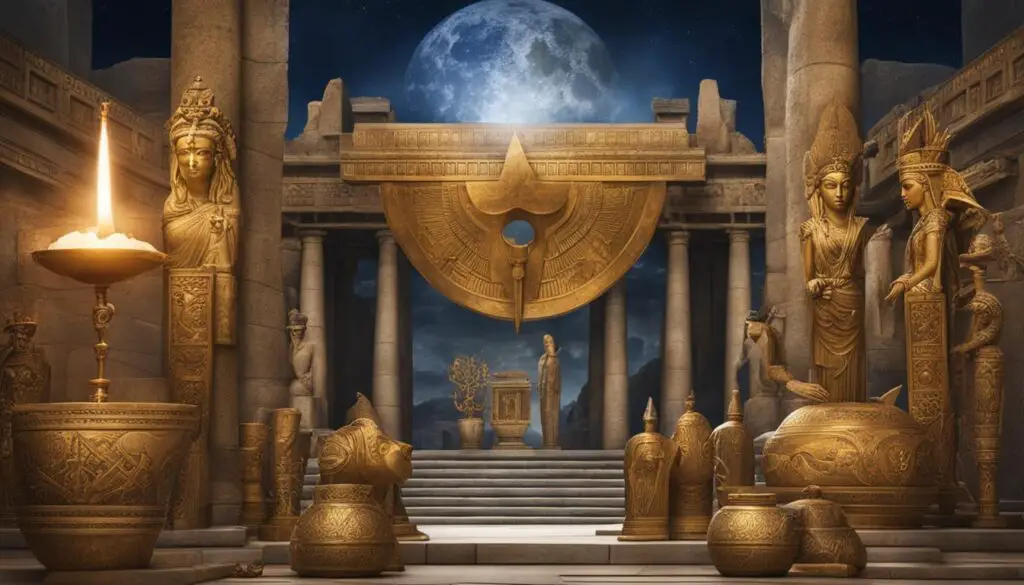Welcome to our exploration of the fascinating world of ancient religions. Today, we delve into the question of whether Greek mythology predates Judaism and uncover the historical timeline and influences of these mythological beliefs. Join us as we delve into the rich tapestry of religious history.
As we embark on our journey, we will examine the origins of Greek mythology, which is believed to have originated around the 12th century BCE in ancient Greece. Drawing inspiration from earlier mythologies and oral traditions, Greek mythology comprises a vast array of stories and characters that continue to captivate our imagination.
On the other hand, Judaism, one of the oldest religions, is believed to have been founded by Abraham around 2000 BCE. This makes it older than Greek mythology and provides a unique perspective on ancient religious practices and beliefs.
Through our exploration, we will uncover the profound influence of Greek mythology on ancient Greek society, from religious practices and rituals to art and literature. Likewise, we will delve into the early history of Judaism, starting with the covenant between Abraham and God, and the pivotal roles of key figures like Moses and King David.
Key Takeaways:
- Greek mythology originated around the 12th century BCE in ancient Greece.
- Judaism predates Greek mythology, founded by Abraham around 2000 BCE.
- Greek mythology influenced various aspects of ancient Greek society, including religious practices, art, literature, and moral guidance.
- Judaism has a rich early history, with key figures like Abraham and Moses playing significant roles.
- Understanding the timelines and influences of ancient religions deepens our insight into religious history.
Key Figures and Stories in Greek Mythology
Greek mythology is a rich tapestry of captivating stories and legendary figures that have fascinated people for centuries. Let’s delve into some of the key figures and stories that make up this ancient belief system.
Zeus, the King of the Gods
One of the most prominent figures in Greek mythology is Zeus, the king of the gods. Known for his lightning bolt and his supreme power, Zeus presided over Mount Olympus, the celestial home of the gods. He played a significant role in many of the myths and legends, often intervening in the affairs of mortals and other gods.
Hera, the Queen of the Gods
Another important figure in Greek mythology is Hera, the queen of the gods and the wife of Zeus. As the goddess of marriage and family, Hera was known for her beauty, jealousy, and protectiveness over married women. She often featured prominently in stories that revolved around the struggles between husbands and wives.
The Myth of Persephone and the Underworld
One of the most enduring stories in Greek mythology is the myth of Persephone, the daughter of Zeus and Demeter. According to the myth, Persephone was abducted by Hades, the god of the underworld, and taken to his realm. This resulted in a severe famine on Earth until a compromise was reached, allowing Persephone to spend part of the year with her mother and the other part as the queen of the underworld.
The Trojan War and the Heroes
No discussion of Greek mythology would be complete without mentioning the legendary Trojan War. Fought between the Greeks and the Trojans, this epic conflict has been immortalized in the poems of Homer, particularly in the ‘Iliad’ and the ‘Odyssey’. Heroes like Achilles, Hector, and Odysseus gained fame and glory through their exploits in this war, and their stories continue to captivate readers and audiences today.
The Myth of Prometheus and Pandora
Finally, the myth of Prometheus and Pandora is a tale of punishment and human curiosity. Prometheus, a trickster god, stole fire from the gods and gave it to humanity, leading to their progress and civilization. As punishment, Zeus sent Pandora, the first woman, to Earth with a box containing all the evils of the world. Despite being warned not to open the box, Pandora’s curiosity got the better of her, unleashing these evils upon humanity.
In conclusion, Greek mythology is replete with fascinating characters and captivating stories. From the mighty Zeus and the jealous Hera to the epic Trojan War and the tragic tale of Prometheus and Pandora, these myths continue to inspire and intrigue us, providing a window into the ancient world and the beliefs of the people who lived during those times.
Influence of Greek Mythology on Ancient Greek Society
Greek mythology had a profound influence on various aspects of ancient Greek society. It served as the foundation for religious practices, shaping the beliefs and rituals of the people. Temples were built to honor the gods, and ceremonies were performed to appease them. These religious practices were an integral part of daily life and provided a sense of identity and unity among the ancient Greeks.
Not only did Greek mythology impact religion, but it also had a significant influence on art and literature. The stories and characters from Greek mythology were depicted in sculptures, paintings, and epic poems. Artists sought to capture the essence of these myths, immortalizing them through their creative works. Greek literature, especially the epics of Homer, drew inspiration from the myths, incorporating them into tales of heroes and adventures.
The moral guidance provided by Greek mythology cannot be overlooked. Many of the myths carried moral lessons and ethical teachings. These tales taught the ancient Greeks about the consequences of hubris, the importance of honoring the gods, and the virtues of loyalty, courage, and wisdom. Greek mythology provided a framework for understanding the world and one’s place in it, offering guidance on how to live a virtuous and meaningful life.
Early History of Judaism

The early history of Judaism is rich and fascinating, with its origins dating back to around 2000 BCE. According to biblical accounts, Judaism was founded by a man named Abraham, who made a covenant with God. This covenant marked the beginning of the Jewish people and their unique religious beliefs and practices.
Abraham, a figure of great importance in Judaism, was instructed by God to leave his homeland in Mesopotamia and settle in Canaan. This migration and settlement played a significant role in shaping the identity and history of the Jewish people. It was through Abraham’s lineage that the twelve tribes of Israel were born, leading to the establishment of the nation of Israel.
Key Figures in Judaism
- Moses: A central figure in Judaism, Moses played a crucial role in the liberation of the Israelites from slavery in Egypt. He is revered as a prophet, lawgiver, and leader.
- King David: Known for his leadership and military prowess, King David is considered one of the greatest kings in Jewish history. He is also credited with writing many of the psalms found in the Book of Psalms.
- Abraham: As mentioned earlier, Abraham is the patriarch of Judaism and a central figure in its early history. His unwavering faith and devotion to God set the foundation for the Jewish faith.
These key figures, among others, played significant roles in the early history and development of Judaism, shaping its beliefs, traditions, and customs. Their stories and teachings continue to be revered and studied by Jewish communities worldwide.
Conclusion
In comparing Greek mythology and Judaism, it is evident that Greek mythology predates Judaism in terms of origin and development. Greek mythology emerged around the 12th century BCE, while Judaism traces its roots back to around 2000 BCE with the covenant made by Abraham. This distinction gives us a glimpse into the ancient religions that shaped the beliefs and practices of different civilizations.
The influence of Greek mythology on ancient Greek society cannot be underestimated. It permeated various aspects of life, including religious practices, artistic expressions, and moral guidance. The stories and characters from Greek mythology inspired the construction of temples, the creation of magnificent artwork, and the transmission of important moral lessons.
On the other hand, Judaism has its own rich and distinct history. The figure of Abraham stands prominently as the founder of the Jewish faith and his covenant with God laid the foundation for the Jewish people. Moses and King David further shaped the development and leadership of Judaism, leaving an enduring impact on religious practices and beliefs.
Examining the timelines and influences of ancient religions like Greek mythology and Judaism allows us to delve deeper into the religious history of civilizations. It broadens our understanding of the diverse beliefs, practices, and cultural expressions that have shaped humanity throughout the ages.
FAQ
Does Greek mythology predate Judaism?
No, Judaism predates Greek mythology. Greek mythology originated around the 12th century BCE, while Judaism was founded around 2000 BCE.
What are some key figures and stories in Greek mythology?
Some key figures in Greek mythology include Zeus, Hera, Persephone, and characters from the Trojan War. Stories like the myth of Prometheus and Pandora are also well-known.
How did Greek mythology influence ancient Greek society?
Greek mythology had a significant impact on various aspects of ancient Greek society. It served as the basis for religious practices, inspired works of art and literature, and provided moral guidance.
What is the early history of Judaism?
Judaism is believed to have been founded by Abraham around 2000 BCE. Moses and King David are among the key figures in the early history of Judaism.




